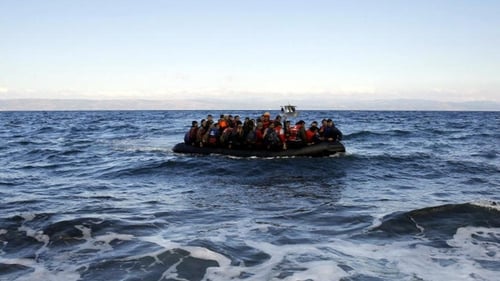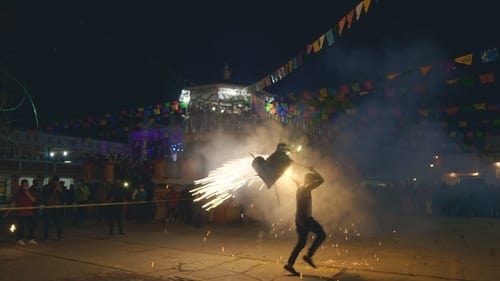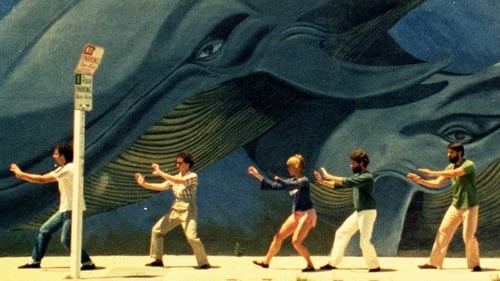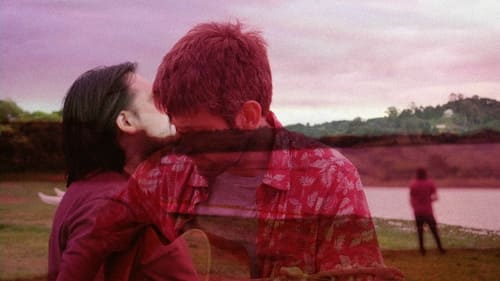It Was Hot That Day: A Jandiman Story (2024)
Hot days, migrant dreams, and the dance of ordinary images—a tale of passion, struggle, and the American Dream.
Género : Documental
Tiempo de ejecución : 11M
Director : Chisco Valdés
Sinopsis
Enduring 28 days of relentless construction labor, Frank struggles to prep a house for painting amidst Phoenix's scorching pandemic summer.

Follow Chris Cotter, an American traveler, as he explores a common migration path through Ethiopia and into Israel, tracking the plight of Eritrean refugees. Chris and his crew visit several refugee camps, including the never-before-documented Afar region. The refugees tell stories of oppression, torture, and survival. Searching for solutions, Chris speaks to various NGOs and experts, including Assistant Secretary of State, Anne Richard. The outlook is bleak, but the spirit of the Eritrean refugees is hard to ignore.

La isla de Lampedusa es el punto más meridional de Italia, que desde 1990 se ha convertido en un lugar masivo de desembarco de inmigrantes ilegales procedentes de tierras africanas. En poco más de 20 años, más de 20.000 personas se han ahogado durante la travesía para alcanzar lo que para muchos supone vía de entrada a Europa, y que les debería permitir escapar de la guerra y el hambre. Samuel vive en la isla, tiene 12 años, va a la escuela, le gusta tirar con la honda e ir de caza. Le gustan los juegos de tierra, pese a que todo a su alrededor habla del mar y de los hombres, mujeres y niños que intentan cruzarlo para llegar allí. (FILMAFFINITY)

El cineasta George Casey documenta las migraciones de mariposas, aves, ballenas grises, cangrejos y cebras.

The vegetables come from the garden behind the house, the fish comes out of a can, and money for bread is earned at the factory. It’s because of this money that they came here. Women from Turkey stand side-by-side with women form Mecklenburg at the conveyor belt of a fish-processing factory in Lübeck. Their hands are stained brown, the pungent smell of fish clings to them, and their arms and backs ache. If these jobs were done by men, machines would have been invented long ago to replace them. But female labour is cheap and the women do not complain. They have learned to work – and therein lies the source of their pride. (Source: https://www.artechock.de/film/text/filminfo/g/ge/gefubr.htm)

The Mejia family emigrated from Oaxaca to Fresno, California 40 years ago. Filmmaker Trisha ZIff filmed the family in 1996, and returns now to see the changes that have settled over them, and follows the family on their return to Mexico.

Partitions draws on photographs, state documents, audio recordings and footage of domestic spaces and routines, to tell a story of Sindhi migration following the Partition of India in 1947. Inspired by the life of a woman who was born in Hyderabad, Sindh, grew up in Madras (Chennai) and lived the rest of her life as a Singaporean, the film juxtaposes fragmented recollections of the past with enduring practices of the present.

How do 1.1 billion people around the world live on less than one dollar a day? Four young friends set out to research and live this reality. Armed with only a video camera and a desire to understand, they spend just 56 dollars each for 56 days in rural Pena Blanca, Guatemala. They battle E.Coli, financial stress, and the realization that there are no easy answers. Yet, the generosity and strength of their neighbors, Rosa, Anthony and Chino gives them resilient hope. They return home transformed and embark on a mission to share their new found understanding with other students, inspiring and challenging their generation to make a difference.

Venturing from Venice Beach to Watts, Varda looks at the murals of LA as backdrop to and mirror of the city’s many cultures. She casts a curious eye on graffiti and photorealism, roller disco & gang violence, evangelical Christians, Hare Krishnas, artists, angels and ordinary Angelenos.

In this Traveltalk series short, we visit a region in Guatemala where the native Indian tribes live like their ancestors, without using most of the benefits of modern man. They not only grow their own vegetables and catch animals to eat, they also cultivate the plants they need to weave fabrics and make natural dyes from various berries and seeds.


At the beginning of the 60's, thousands of Portuguese turned up in France through the underground. They were fleeing misery, war and repression. Left to unscrupulous smugglers, they had to cross the Iberian Peninsula tracked by the Portuguese and Spanish police. For many, the voyage towards France turned into a disaster. As a child in a shantytown, the author remembers having heard about these terrible odysseys. Thirty years later, he goes in search of the stories of his childhood and seeks to understand what sparked this unprecedented emigration known as the "plebiscite by foot" against Salazar. Between childhood memories and historical investigation, he looks for the images of this exodus, the largest in post-war Europe.

En 1979, José Efraín Ríos Montt renace cuando se convierte al cristianismo. Está dando un sermón a dos alumnos cuando un grupo de soldados irrumpe en su escuela cristiana para pedirle dirigir el golpe de estado de 1982. Francisco Chávez Raymundo y su hermana eran niños pequeños cuando su comunidad fue arrasada a causa de las politicas de Ríos Montt. En marzo de 2013, la vida de Francisco Chavez y Efraín Ríos Montt convergen en el mismo espacio. Llamado por la justicia guatemalteca, Ríos es confrontado por un grupo de huérfanos y viudas de la guerra. Uno de ellos es Francisco.

A través de la llegada de una periodista a El Salvador, el documental explorra la lucha de la activista Morena Herrera y la Agrupación Ciudadana para liberar mujeres que han caído presas injustamente, acusadas de practicarse abortos, con penas de hasta 40 años de cárcel.

After losing her father at an early age, Tina Duran explores the rich history of her father, the story of her ancestors who migrated from Mexico to the United States, and the implications the Vietnam War had on their community.

Relámpago Negro is a professional wrestler who lived in his own flesh the golden age of wrestling in Guatemala. 40 years later everything has changed, except his passion for the sport. Relámpago Negro tells us how his passion leads him to keep wrestling alive after so long, building a legacy for professional wrestling until this day.

Since 1999, more than 2,000 women have been murdered in Guatemala, with numbers escalating every year, yet lawmakers and government officials turn a blind eye. Powerful and uncompromising, Killer's Paradise uncovers an emotionally wrenching human rights tragedy, while exposing an inept judicial system that allows it to happen. After almost four decades of civil war, Guatemala is a troubled society, but it can also be seen as a microcosm of the pervasive violence and injustice against women worldwide.

Un lote de masa madre blanda. Dos lagartos radiactivos. Tres latas de sopa de tomate Campbell. Cuando comenzaron los bloqueos de COVID-19 en 2020, personas de todo el mundo comenzaron a informar sueños más vívidos.







